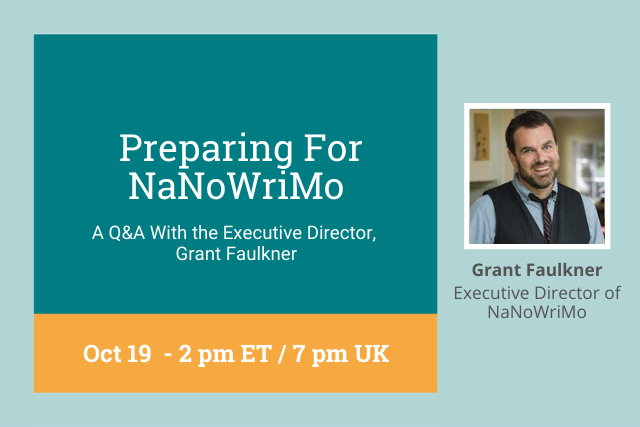
It sounds impossible until you do it that first time. Then you realize it’s not that hard. In fact, you can train yourself to pump out the words needed every day until you reach your goal.
We’re talking about NaNoWriMo, of course (National Novel Writing Month). In case you live under a rock and haven’t heard of it, NaNoWriMo is an annual international challenge where writers attempt to finish a rough draft of an entire novel in 30 days.
There’s a lot of hoopla surrounding NaNoWriMo.
In pre-Covid times, several groups converged in major cities around the world to write together throughout November. They offered each other support and company for what might otherwise be a rather lonely endeavor. It’s fun to talk shop with another writer when you’re both in the crush of trying to write 50,000 words in 30 days (1,666.67 words per day). This year, writers will be converging in Zoom calls and Facebook groups to support each other as they try to reach that goal.
So how on Earth do you ever fit in that much writing every day? Well, here are some tips to help you be your most productive. It’s time to win NaNoWriMo, and here’s how you do it:
Write first. Proofread in December.
It’s all about getting the words down on the page (or the computer screen). We published an article a couple of months ago about ilys, an online platform that only allows you to see the last letter you typed on the screen. You can’t go back and edit—you can only keep typing until you’ve hit your word goal for the day. While this platform may take the “just write, don’t edit” rule further than many writers are comfortable with, the idea remains the same whether you are writing in Word, Scrivener or with a quill and ink.
Truly, don’t edit. There’s plenty of time for that later. Turn off your inner editor, and just plow through your daily word goal. Whatever gets typed (or written), you can always edit it in December. Remember, as Hemingway said, “the first draft of anything is shit”.
Find your best time.
We all have 24 hours a day in which to work, play, live, and write. You need to find the perfect time in those 24 hours when you’re at your best writing ability. For me, it’s early in the morning (seriously, I get up at 4am). For others, it may be late at night after the kids have gone to bed, or even on your lunch hour at work.
Sometimes it helps having a set and scheduled time to write. If you know you only have the one hour at your lunch break, you’ll write like a mad person to get everything done in that one hour.
Writing isn’t always pen to paper (or fingers to keyboard).
Try some of these other ways to capture your thoughts. Something just might spark your creativity and unleash a river of words.
- Take a voice recorder with you on a walk through the woods. Something about nature inspires and lets your mind create connections that you don’t see when you’re staring at the blank screen.
- Try writing in longhand if you always type on the computer. And vice versa, type if you normally hand-write.
- Explain your book’s synopsis to a friend. Sometimes when we try to describe our work to others, we refashion it based on their feedback. Just make sure you capture those ideas you have on your voice recorder, in a notebook, or on a laptop.
- Tap into a life-giving place. Maybe you always write at the kitchen table at home. Try taking your laptop or a tablet to a coffee shop filled with other NaNoWriMo participants. Or head out to a park and write at a picnic table for an hour. Wherever you find energy, try writing there.
Write the scenes as they come to you.
Nowhere does it say your novel must be written in order. If your mind is filled with thoughts of the final denouement, write that first. Just write whatever comes to mind at the moment, and worry about putting it in an order a reader would understand later. Again, that’s what December is for.
Stop before you’re done.
If you can, stop before you’re done with the scene at hand. Say you’ve hit your daily goal of 1,666.67 words per day in the middle of a scene. Stop right there.
Then the next day, you can read over what you wrote to prime your pump, and you’ll be ready to drop right back into your story’s world and spin out more scenes.
Resist the temptation to keep going. Stopping mid-scene keeps the ideas firmly in your mind so that you’ll be able to maintain that momentum when you begin again. This way, you can crank out another 1,666.67 words to meet your goal.
If you leave a little bit in your tank, you’ll have fuel to get started the next day.

Set better goals.
Your goals must be simple, must be achievable, and must be specific. A goal of “Write the first scene of Chapter 2 using the daily 1,666.67 word count” is much more specific than a goal of “Write 1,666.67 words today.” When you’re more specific, you’ll find it easier to meet your goal.
Reward yourself.
It may be something as simple as eating a donut after you’ve reached your daily word count. Or it could be something more substantial like a day at the spa when you’ve reached the 50,000 word goal.
Whatever motivates you, use it as a reward for reaching a goal and make it mean something to you.
Don't let the looming self-edit put you off your writing game.
Start editing like a pro with your free ProWritingAid account
When a reader sees a grammar error, they start to lose faith in the writer who made it.
ProWritingAid is one of the best grammar checkers out there - but it's far more than that! The Editing Tool also looks at elements of structure and style that have an impact on how strong and readable your writing is.
More, it helps you learn as you edit, making you a better writer every time you use the program.
The best way to find out how much ProWritingAid can do is to try it yourself!
Final thoughts.
Think of NaNoWriMo as 30 days of writing a rough draft of what your novel will be. When you capture your thoughts on the screen (or paper), you get the foundation of your novel into to place. Then when December comes, you can start the rewriting process that will make sense out of the madness that was November. Or better yet, wait until the New Year to get a fresh perspective on your work.
If you want to be a writer, you need to write. There’s no other way to get there. NaNoWriMo can be the impetus that sets you on the path to becoming the writer you want to be.
Preparing For NaNoWriMo: A Q&A With the Executive Director, Grant Faulkner
November is fast approaching, and with it comes National Novel Writing Month, the writing challenge that asks you to write a 50,000 word novel in 30 days.
We've asked the ultimate NaNo expert—NaNoWriMo Executive Director, Grant Faulkner—to share his advice. Join us for a Q&A and get all your questions answered.


